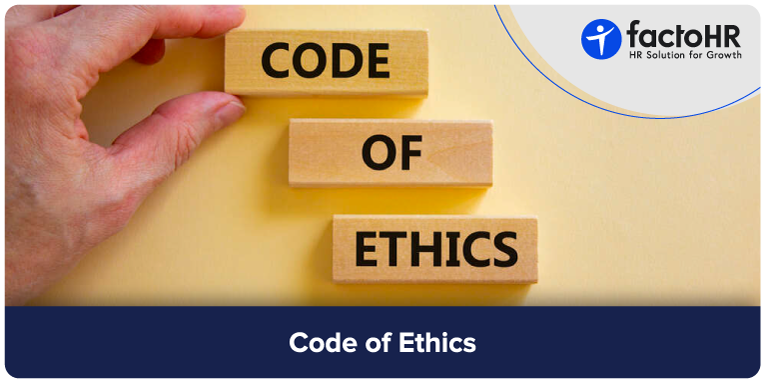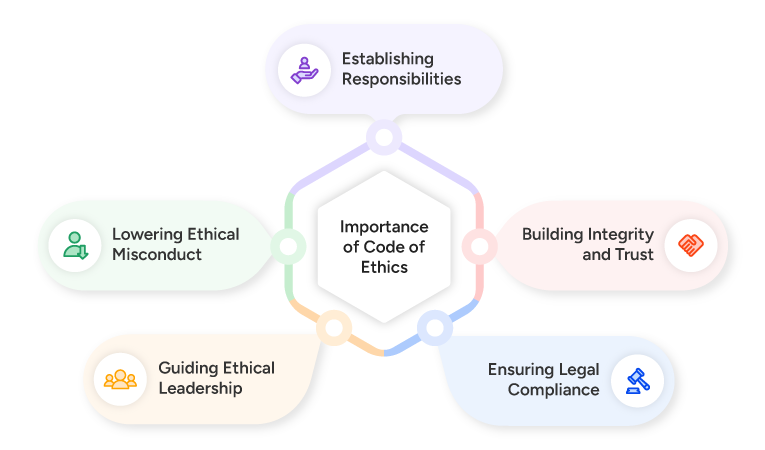Code of Ethics: Meaning, Principles, Types, and Examples

Table of Contents
Key Takeaways
- A code of ethics is a set of principles that help employers and HR professionals to make fair decisions in any unwanted situations.
- The purpose of these principles is to build a strong work culture based on honesty, integrity, respect, and accountability.
- These principles set the rules that guide employee behavior, protect the workplace, and maintain stakeholder trust.
What is a Code of Ethics?
The meaning of code of ethics is a formal framework of ethical principles that guides employees, leaders, and stakeholders in making moral and responsible decisions.
An organization’s code of ethics establishes behavioral standards for issues like conflicts of interest, fraud, discrimination, or harassment so that everyone is operating in alignment with a consistent set of ethical expectations.
Some industries, such as finance or healthcare, have vital legal requirements that require adhesion to a set of rules. Many organizations voluntarily adopt such codes to demonstrate their commitment to rightful practices.

Purpose of Codes of Ethics
The sustainable development of an organization is the primary purpose of all ethical codes.
Below are some of the goals:
- It ensures compliance with laws and rules.
- Build and promote an ethical and predictable environment.
- Identify and address the need to enforce ethical values and guidelines.
- It offers clear rules and guidelines for internal and external stakeholders.
- It promotes trust among all the stakeholders by clarifying the organization’s ethical stance and intent.
Core 3 Principles of a Code of Ethics
Core values are the foundation of the organization’s central ideas, which serve as the basis for an ideal code of conduct.
While these rules may differ based on organizational standards, general principles of business ethics form the core of these rules.
Integrity
This is the basis of moral behavior. It means upholding ethical standards under challenging situations and operating honorably and consistently, irrespective of the scenario. Employees should make wise judgments, avoid conflicts of interest, and behave accordingly.
Respect
Respect is the basic principle of creating an inclusive and balanced work environment. This principle involves treating colleagues, customers, and other stakeholders professionally. Respectful conduct helps build genuine relationships and manage work conflicts.
Responsibility
Responsibility means accepting accountability for one’s deeds and choices. Employees become aware of their actions, choices, and their impacts.
Importance of Code of Ethics
A code of conduct is essential for any company because it sets the foundation for its culture, ensures legal compliance, and builds stakeholder trust. Below are the main reasons why every business should have one.

Establishing Responsibilities
It clarifies satisfactory operations and helps staff learn their roles. The establishment of legal norms ensures equality and provides a foundation for addressing moral responsibilities.
Building Integrity and Trust
Ethical conduct builds trust among the company and stakeholders, including the community, suppliers, investors, and consumers. Transparent organizations easily retain employee loyalty and partners.
Ensuring Legal Compliance
Organizations can adhere to applicable rules and regulations by having a clear code of conduct. In sectors like banking or healthcare, where laws are stringent, well-defined principles support legal compliance, helping companies avoid legal issues and maintain regulatory requirements.
Guiding Ethical Leadership
A code of conduct encourages leadership at all organizational levels. When leaders model proper conduct by upholding the code, subordinates understand their moral responsibilities and work responsibly to achieve their goals.
Lowering the Risk of Ethical Misconduct
Companies with an ideal ethical code are less vulnerable to problems related to fraud, corruption, or misconduct. In addition to protecting employees, the code helps address the hazards of inappropriate behavior.

Code of Ethics vs Code of Conduct
| Aspect | Code of Ethics | Code of Conduct |
|---|---|---|
| Purpose | Defines the organization’s moral principles and values to guide ethical decision-making. | Provides specific rules and expected behaviors employees must follow daily. |
| Scope | Broad, value-based, and focused on integrity, honesty, transparency, and accountability. | Narrower, action-oriented, detailing acceptable and unacceptable behavior. |
| Focus Areas | Addresses core components of ethics such as integrity, responsibility, respect, fairness, and confidentiality. | Covers policies like workplace behavior, mission and vision alignment, disciplinary actions, and employee rights. |
| Application | Helps employees handle ethical dilemmas and make responsible decisions. | Ensures consistent behavior and compliance with organizational rules. |
| Keyword Coverage | Explains ethical standards, values, and moral expectations. | It explains the meaning of a code of conduct and includes examples like anti-harassment rules, attendance guidelines, and reporting procedures. |
Types of Code of Ethics
Depending on the sector, the organization’s objectives, the law, and codes of conduct could take many shapes.
Compliance-Based
Most ethics codes under this category commonly emphasize adherence to the law and avoiding illegal activities. Compliance-based codes are usually created to spell out the exact conditions and steps to be taken by employees in their work.
Value-Based
This kind of code does not just limit itself to following the laws of the land, but highlights the organization’s core values. A value code based on ethical conduct often reflects the company’s honesty, integrity, respect, and fairness. The subjects can also include corporate social responsibility and environmental sustainability.
Profession-Specific
This code of conduct applies only to members of a particular profession, such as doctors and lawyers. Profession-specific regulations generally express professionals’ ethical obligations to their clients, colleagues, and the public.
Content-Focused Codes
Content-focused codes define the rules precisely. Thus, they give straightforward instructions that lead to ethical behavior among the organization’s members. These codes ensure the staff knows what is expected of them, resulting in a shared understanding of moral behavior.
How to Create a Code of Ethics for Your Organization
- Gather Information: Understand your company’s values and issues employees may face.
- Create the Draft: Write clear and simple ethical guidelines.
- Review the Draft: Get feedback from leaders and employees.
- Adopt the Code: Get formal approval from the management.
- Introduce the Code: Share it with all employees through training or meetings.
- Enforce the Code: Monitor behavior and take action when rules are broken.

Some Examples of a Code of Ethics
Below are examples of codes of ethics from world-renowned companies to help you better understand the topic.
- Encourages employees to act with honesty and transparency.
- Focuses on respect, fairness, and doing what is right.
- Applies the same standards to employees, vendors, and contractors.
Hershey
- Uses a Q&A style to help employees make ethical choices easily.
- Promotes honesty, respect, and following legal rules.
- Guides employees on how to handle confusion or ethical dilemmas.
Pepsico
- Provides clear guidelines on different aspects of work ethics.
- Supports diversity, inclusion, and respectful interactions.
- Encourages employees to speak up when they see unethical actions.
Starbucks
- Encourages employees to raise concerns without fear.
- Focuses on making ethical choices in difficult situations.
- Promotes community involvement and positive behavior.
Visa
- Teaches employees to act with accountability and respect.
- Encourages open communication and teamwork.
- Provides guidance for making decisions that match company values.
Conclusion of Code of Ethics
Every organization benefits from having clear ethical rules that promote honesty, responsibility, and trust. A strong code helps employees understand the right way to act, make better decisions, and avoid unethical behavior.
Companies can use a code of conduct policy template or follow basic guidelines for developing a code of ethics to create a policy that fits their values. Whether compliance-based or value-driven, an ethical framework helps businesses stay responsible, fair, and sustainable in the long run.

Frequently Asked Questions
What is Code of Conduct?
Code of conduct is a set of rules that explains how employees should behave at work. It includes acceptable and unacceptable actions to maintain a respectful and professional workplace.
What Happens if an Employee Violates the Code of Conduct?
In that case, the company may issue a warning, provide corrective training, or take disciplinary action such as suspension or termination, depending on the seriousness of the violation.
How Often Should a Code of Conduct be Reviewed and Updated?
A code of conduct should be reviewed at least once a year or whenever laws, company policies, or workplace practices change.
Are Employees Legally Required to Follow the Code of Conduct?
Yes, Employees must follow the code of conduct because it is an official company policy.
What are the Five Ethical Principles?
The industry is guided by five ethical principles: integrity, objectivity, professional competence, confidentiality, and professional behavior.
Which Methods Can HR Use to Assess the Impact of the Code of Ethics?
HR can evaluate how well their Code of Behavior works by conducting employee mood surveys, tracking adherence to ethical standards, reviewing incident reports concerning ethical breaches, and examining the general workplace culture.
How Can HR Implement the Code of Ethics across the Organization?
HR professionals can implement a code by organizing training sessions for employees about its significance and incorporating ethical considerations into the hiring process.
Grow your business with factoHR today
Focus on the significant decision-making tasks, transfer all your common repetitive HR tasks to factoHR and see the things falling into their place.

© 2026 Copyright factoHR


